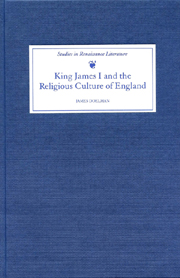Book contents
- Frontmatter
- Preface
- Chapter 1 BEGINNINGS: THE ROOTS OF JAMES' ROLE IN RELIGIOUS CULTURE
- Chapter 2 THE ACCESSION OF KING JAMES I AND ENGLISH RELIGIOUS POETRY
- Chapter 3 PROPHETS AND THE KING
- Chapter 4 KING JAMES, ANDREW MELVILLE AND THE NEO-LATIN RELIGIOUS EPIGRAM
- Chapter 5 FROM CONSTANTINIAN EMPEROR TO REX PACIFICUS: THE EVOLVING ICONOGRAPHY OF JAMES I
- Chapter 6 KING JAMES AND THE POLITICS OF CONVERSION
- Chapter 7 THE SONGS OF DAVID: KING JAMES AND THE PSALTER
- Chapter 8 THE DEATH OF SOLOMON
- WORKS CITED
- Index
Chapter 4 - KING JAMES, ANDREW MELVILLE AND THE NEO-LATIN RELIGIOUS EPIGRAM
Published online by Cambridge University Press: 05 February 2013
- Frontmatter
- Preface
- Chapter 1 BEGINNINGS: THE ROOTS OF JAMES' ROLE IN RELIGIOUS CULTURE
- Chapter 2 THE ACCESSION OF KING JAMES I AND ENGLISH RELIGIOUS POETRY
- Chapter 3 PROPHETS AND THE KING
- Chapter 4 KING JAMES, ANDREW MELVILLE AND THE NEO-LATIN RELIGIOUS EPIGRAM
- Chapter 5 FROM CONSTANTINIAN EMPEROR TO REX PACIFICUS: THE EVOLVING ICONOGRAPHY OF JAMES I
- Chapter 6 KING JAMES AND THE POLITICS OF CONVERSION
- Chapter 7 THE SONGS OF DAVID: KING JAMES AND THE PSALTER
- Chapter 8 THE DEATH OF SOLOMON
- WORKS CITED
- Index
Summary
ANDREW Melville, the Scottish scholar, preacher, and poet, is most often remembered for his confrontation with King James at the Falkland General Assembly of 1596, at which time he plucked James by the sleeve, and referred to him as “God's sillie vassal”. While this is typical of the tension between the king and the de facto leader of the Scottish Presbyterians from the 1580s on, their relationship went through a series of stages, with frequent periods of ambivalence on the part of both men. At times, Melville was quite prepared poetically to praise James as at least a potential godly prince. He produced a great range of literary works, many of which had some relation to King James: these ranged from celebrations of Queen Anne's coronation and the birth of Prince Henry, to satiric epigrams on the English church. As a writer whose major works are in Latin he is less accessible than many better known, yet less significant, contemporaries. Although he devoted most of his life to theological scholarship and church government, his fame as a poet was widespread, and his poems, however short, circulated widely and provoked great controversy. Unlike many ecclesiastics his poetic production did not slow down later in life: he continued to write until his death in 1622 at the age of seventy-seven. An examination of Melville's writings and activities will illustrate the interconnectedness of English and Scottish ecclesiastical and theological controversies, the significance of Latin poetry in these conflicts, and the tendency for new controversies to resurrect the arguments and texts of earlier, and at times, significantly different conflicts.
- Type
- Chapter
- Information
- King James I and the Religious Culture of England , pp. 57 - 72Publisher: Boydell & BrewerPrint publication year: 2000



